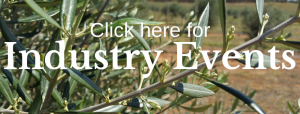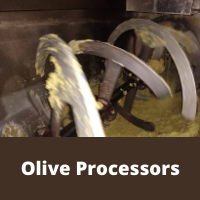Anita Donaldson
The Olivegrower & Processor ‘Rake in the Savings’ competition has been run and won and the lucky winners are thrilled at the news they will each receive the new ALICE Electromechanical Olive Harvester.
The Australian winner was Campbell Mercer, an olivegrower from Mt Egerton in Victoria, while the New Zealand winner was Charmaine Maitland of Man ‘o War Olive Groves at Waiheke Island.
The competition ran through the early months of 2009 where new and existing subscribers had the opportunity to answer the question: “What do you think is the biggest challenge facing today’s olivegrower” to win one of two harvesters made available by Eclipse Enterprises and Allendale Garden Products (New Zealand Campagnola agents).
Olivegrower & Processor received close to 100 entries from growers all around Australia and New Zealand – one of the most successful and popular reader competitions we’ve ever held.
George Atsalis of Eclipse Enterprises said he was incredibly pleased with the sheer volume of creative and informed responses submitted in the competition. “The effort put in by some entrants was simply amazing,” he said.
Here are Charmaine and Campbell’s winning entries, plus another selection of entries received:
Charmaine Maitland: “I think the biggest challenge facing today’s olivegrower is educating Australians and New Zealanders on the great benefits of local extra virgin olive oil. The average consumption per person in New Zealand of EVOO is about 200ml per year, whereas Greeks consume 25L per person per year! The many health benefits of extra virgin olive oil are unknown in many households. The olive associations need to make a combined effort to educate the general public.”
Campbell Mercer: “The biggest challenge facing today’s olivegrower is to ‘thread the needle of commercial viability’. The grower must nurture their olives in an ecologically sustainable manner against a backdrop of stretching economic conditions, disinterested political climate and testing environmental conditions; before efficiently harvesting and processing them in a time-critical and economic operation. Finally the grower needs to market the resulting olives/oil into a relatively uninformed and typically price-driven marketplace against heavily subsidised and established international competitors while achieving a return that makes the risk, capital resources, significant effort and personal commitment, worthwhile.”
Ian & Helen De Lacy, Campaspe Valley Olives, Victoria sent us a poem:
“The dream of untold wealth that grows on trees that spread on cheap and endless acres,
Whilst Mediterranean groves shrink and fade before a plague of seaside villas
Perhaps a style of life or life of style
An Idyll in an antipodean Tuscany
And all we need to do is educate our own
And wallow in the prospect of splashing on two billion sweet and sours.
But dumping from afar may mar the dream
Expenses unforeseen that cost us dear
The shrinking pool of relatives and friends
And harsh blue skies that never shed a tear.”
Barry & Alexina Johnson, Mapleton Queensland: “We have the immense satisfaction of selling our olive oil locally. The oil comes from our 1000 trees which are harvested with community help (giving locals an annual stimulus) and then pressed and bottled on-farm. Our community identifies with the local product and takes pride in helping produce a first-class and healthy oil with demand far exceeding supply. The biggest challenge facing today’s olivegrower is how to instill our local pride in an Australia-wide appreciation that our Aussie product is the result of best practice and is a world-beater; second to none!
Cliff and Anne Rolfe, Ripley, QLD: “Following two years of preparation of ourselves and the soil, in December 2008 we planted our first olive grove of 206 trees for table olives. Now our biggest challenge comprises of economically caring for the land and trees, producing high-quality fruit consistent with the recently established Code of Practice for the Olive Industry and then we must find our niche in this industry through promotion of the product to, initially, a primarily local market at competitive prices.”
Pat and Lin Turner, Cunderdin, WA: “I’m a grower and member of the WAOC. Our biggest challenge is overcoming apathy and secretiveness and being sustainable. Apathy because more input from all our growers is needed and membership of the regional associations and AOA is paramount. It’s necessary to guarantee that the Associations can survive when the now very busy Committee members move on. Secretiveness: the olive industry should start sharing grove costs and ideas on a wider scale and not compete against each other. We should consider how we can reduce the cheap imports and encourage the customer to buy our near perfect Aussie oils.
Jim Dawson, Warworth, New Zealand: “Our 18 member olive co-op is not unfamiliar with problems facing the industry today. The biggest challenge we face now and in the future is that of getting the fruit off the trees and to the processors. Many olive trees are grown on land whose contours make it less suitable for other agricultural purposes but good drainage for olives and as such they are difficult to access for large sophisticated harvesting plant and equipment. Hence hand-harvesting is the only answer. Unfortunately, labour for picking is at a premium and whatever can be done to speed up the harvesting, the better.”
L & P Davidge, Pokeno, New Zealand: “We are a small concern with 500 trees that my husband and I care for on our own. I believe marketing is the biggest challenge facing today’s olivegrower. I have heard from larger growers that selling has been very difficult this last year particularly. The novelty has worn off and the public, with access to cheaper products in supermarkets are not spending their money on the high quality, high-priced oil in the boutiques or even the local markets. Education on the value and best use of olive oil may help, but it will be a slow process.”
V&G Preece: Northland, New Zealand: “We are growers on a small grove, 550 trees only. To date, our biggest challenge has been marketing our oil, although this has been substantially resolved by teaming up with three other growers in the same area and determinedly developing an export market to Canada, UK and very recently, to China. Currently our biggest challenge is how to harvest and supply our growing demand.”
We will have further reader responses to the competition in future editions of FOE, and in Olivegrower & Processor magazine.


